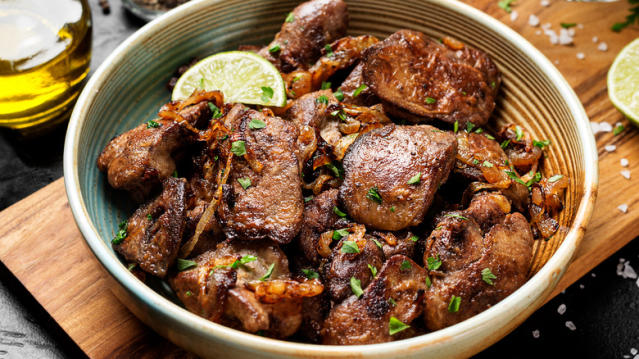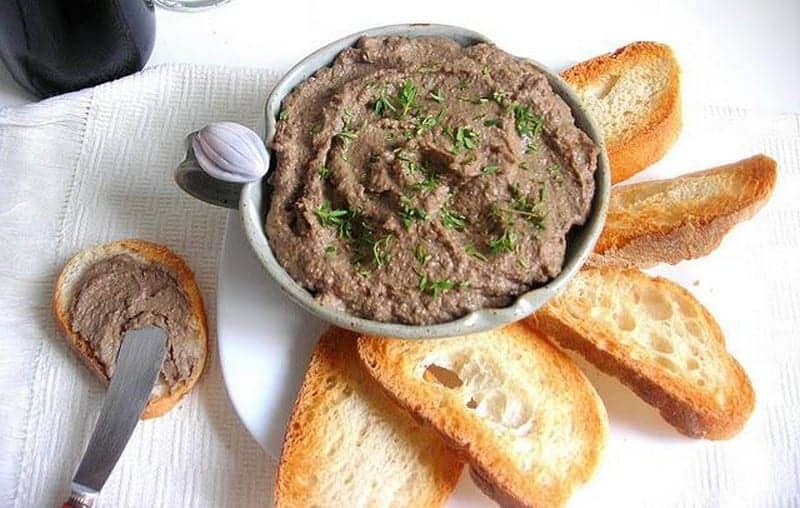How to Cook Chicken Livers? If you’ve ever wondered How To Cook Liver you’ve come to the right place. In this article, we will guide you How to Cook Chicken Livers perfectly. Chicken livers are a type of offal, specifically the liver organ of a chicken. They are commonly used in various culinary traditions around the world due to their rich flavor and nutritional benefits. Here are some key points about chicken livers:

How to Cook Chicken Livers Characteristics:
Appearance: Chicken livers are small, typically dark reddish-brown in color, and have a soft, smooth texture.
Flavor: They have a rich, robust, and slightly metallic taste. The flavor can be intense for some people, which is why they are often soaked in milk to mellow the taste.
Texture: When cooked properly, chicken livers are tender and creamy. Overcooking can make them dry and grainy.
Nutritional Benefits
High in Protein: Chicken livers are an excellent source of high-quality protein, which is essential for muscle repair and growth.
Rich in Vitamins and Minerals: They are packed with vitamins A, B12, and folate, which are important for vision, immune function, and red blood cell formation. They also contain iron, which is crucial for preventing anemia, and selenium, which supports the immune system.
Low in Calories: Despite their rich nutrient content, chicken livers are relatively low in calories, making them a good choice for a nutrient-dense diet.
Learn More Recipe: How to Cook Liver
Cooking chicken livers can be a simple and delicious process. Here are a few methods to cook chicken livers:
Pan-Fried Chicken Livers
Ingredients:
1 lb chicken livers
1 cup milk (optional, for soaking)
1/2 cup flour
Salt and pepper to taste
2 tablespoons olive oil or butter
1 onion, finely chopped
2 cloves garlic, minced
Fresh parsley, chopped (optional)

Instructions:
Prepare the Livers:
Rinse the chicken livers under cold water.
Optionally, soak the livers in milk for 30 minutes to an hour to mellow the flavor and remove any bitterness. Drain and pat dry with paper towels.
Season and Coat:
Season the flour with salt and pepper.
Dredge the chicken livers in the seasoned flour, shaking off any excess.
Cook the Livers:
Heat the olive oil or butter in a large skillet over medium heat.
Add the chopped onion and cook until soft and translucent, about 5 minutes.
Add the garlic and cook for another minute.
Increase the heat to medium-high and add the chicken livers to the skillet in a single layer. Cook for about 2-3 minutes on each side, until browned and cooked through but still slightly pink inside. Avoid overcooking, as the livers can become tough and dry.
Serve:
Transfer the livers to a plate and sprinkle with fresh parsley if desired.
Serve hot with sides such as mashed potatoes, rice, or a fresh salad.
Baked Chicken Livers
Ingredients:
1 lb chicken livers
1 cup breadcrumbs
1/2 cup grated Parmesan cheese
1 teaspoon paprika
1 teaspoon garlic powder
1/2 teaspoon salt
1/4 teaspoon black pepper
2 eggs, beaten
Cooking spray

Instructions:
Prepare the Livers:
Preheat the oven to 375°F (190°C).
Rinse the chicken livers under cold water and pat dry with paper towels.
Season and Coat:
In a bowl, mix the breadcrumbs, Parmesan cheese, paprika, garlic powder, salt, and pepper.
Dip each liver in the beaten eggs, then coat with the breadcrumb mixture.
Bake:
Place the coated livers on a baking sheet lined with parchment paper or lightly greased with cooking spray.
Spray the tops of the livers with a little cooking spray to help them brown.
Bake for 20-25 minutes, or until the livers are golden brown and cooked through.
Serve:
Serve the baked chicken livers with a dipping sauce like honey mustard or a simple squeeze of lemon juice.
Learn More Recipe: How to Cook Bacon in the Microwave
Chicken Liver Pâté
Ingredients:
1 lb chicken livers, trimmed
1/2 cup unsalted butter, divided
1 small onion, finely chopped
2 cloves garlic, minced
1/4 cup brandy or cognac
1/2 teaspoon salt
1/4 teaspoon black pepper
1/3 teaspoon dried thyme
1/4 teaspoon ground allspice
1/2 cup heavy cream
Instructions:
Cook the Livers:
Melt 1/4 cup butter in a large skillet over medium heat.
Add the onion and garlic, cooking until soft and fragrant, about 5 minutes.
Mix the chicken livers and cook until browned on the outside but still pink in the center, about 5-7 minutes.
Add the brandy and cook for another minute to reduce slightly.
Blend the Pâté:
Transfer the mixture to a food processor. Add the remaining butter, salt, pepper, thyme, allspice, and heavy cream.
Blend until smooth, stopping to scrape down the sides as needed.
Chill:
Pour the pâté into ramekins or a serving dish.
Cover with plastic wrap, pressing it directly onto the surface to prevent a skin from forming.
Refrigerate for at least 2 hours, or until firm.
Serve:
Serve the pâté with toasted bread or crackers.

Learn More Recipe: How to Cook Ham Steak
FAQ:
How do I clean chicken livers before cooking?
- Rinse the chicken livers under cold water.
- Trim away any visible fat, connective tissue, and any greenish or yellowish parts (bile).
- Pat the livers dry with paper towels before cooking.
Should I soak chicken livers before cooking?
- Soaking chicken livers in milk for 30 minutes to an hour can help to reduce their strong flavor and make them more tender. This step is optional but recommended for a milder taste.
What is the best way to cook chicken livers?
- Chicken livers can be pan-fried, baked, grilled, or used in pâté. Pan-frying is one of the most popular methods, as it quickly cooks the livers and retains their tenderness.
How do I know when chicken livers are cooked?
- Chicken livers should be cooked until the internal temperature reaches at least 165°F (74°C).
- They should be browned on the outside and slightly pink inside. Overcooking can make them tough and dry.
What can I serve with chicken livers?
- Chicken livers pair well with mashed potatoes, rice, sautéed vegetables, or a fresh salad. They can also be served on toast or crackers as an appetizer.
Can I freeze chicken livers?
- Yes, chicken livers can be frozen both before and after cooking. If freezing raw, ensure they are well-wrapped to prevent freezer burn. If freezing cooked livers, store them in an airtight container and use them within a few months for best quality.
Are chicken livers healthy?
- Chicken livers are highly nutritious, rich in protein, vitamins A, B12, and folate, as well as minerals like iron and selenium. They are also relatively low in calories.
Why do my chicken livers taste bitter?
- Bitterness can come from bile that wasn’t properly removed or from overcooking. Ensure you trim away any greenish or yellowish parts and cook the livers just until they are done.
Can I use chicken livers in place of other meats in recipes?
- Chicken livers have a distinct flavor and texture that may not work well as a direct substitute for other meats in most recipes. However, they can be used creatively in dishes like stews, stir-fries, and sauces.
What seasonings work well with chicken livers?
- Common seasonings for chicken livers include salt, pepper, garlic, onions, thyme, paprika, and parsley. They also pair well with acidic ingredients like lemon juice or vinegar and sweet elements like caramelized onions or balsamic reduction.
How do I avoid overcooking chicken livers?
- Cook chicken livers over medium-high heat and monitor them closely. They usually take about 2-3 minutes per side. Remove them from the heat as soon as they are browned on the outside and slightly pink inside.
Can I eat chicken livers if I’m pregnant?
- Pregnant women should consult their healthcare provider before consuming chicken livers due to their high vitamin A content. Excessive vitamin A can be harmful during pregnancy.
Learn More Recipe: How to Cook Pork Ribs